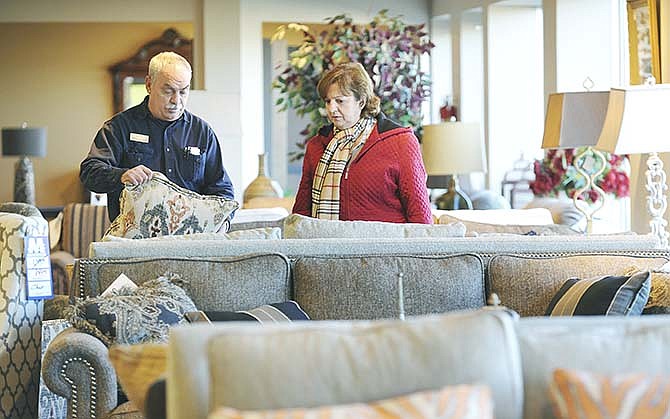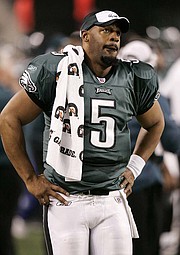Last year was the year of coupons at O'Donoghue's Steaks and Sea Food.
#jcmo INSIDE BUSINESS
[http://www.newstrib…">#jcmo INSIDE BUSINESS now online]"They were my saving grace," said Robert Craig, who co-owns the East High Street restaurant in Jefferson City with Sam Donehue. "Just about every soul that came through the door had a coupon."
But this year's turnout so far has given Craig more confidence in his business' future prospects.
Like Craig, other local business owners and their customers have reported feeling more confident about the economy in recent months, but they're not ready to commit to the sentiment fully until they believe the economy has committed to them.
Confidence is key
"Our economy is about 70 percent consumption; 70 percent of our GDP is people buying things," said David Mitchell, director of Missouri State University's Bureau of Economic Research. "Some of those things they're going to buy no matter what, like food and toothpaste. Other things are going to be different: They're going to buy food, but if they're not confident they're not going to go out to eat."
National consumer confidence has been on the uptick lately, with the University of Michigan's Consumer Sentiment Index coming in at 98.2 in January, the highest in 11 years, and 17 points higher than the same time last year. (An index level of 100 reflects the consumer confidence conditions in the base year of 1966.)
Missouri's consumer sentiment index rose to 77.4 in October 2014 from a level of 68.6 last June, according to the results of a twice-annual Arvest Bank-sponsored survey founded last year to calculate a nationally comparable measure for the Missouri, Arkansas and Oklahoma region.
Based on sales tax revenues, which grow as consumers purchase more merchandise, Jefferson City consumers are more confident as well.
For the fiscal year ending in October 2014, Jefferson City's 1 percent general sales tax brought in about $462,000 over projections, which are based on the previous year's revenues. November's general sales tax revenues, reported in January, came in at $203,563 more than expected.
"That was very encouraging for us locally, because that's been a while," said Shaun Sappenfield, existing business manager at the Jefferson City Area Chamber of Commerce.
The state's increasing consumer confidence can be attributed to factors such as job growth and decreased costs.
"One of the things that's interesting about the Missouri economy is if you look at it over time it has extremely subpar employment growth. It's been really lackluster over the past 20 years," said Mitchell, who evaluates Missouri's data for the Arvest survey. "We've had some good employment growth here within the past four to five months."
Missouri's December unemployment rate was at its lowest since April 2008 at 5.4 percent, down from 6.5 percent in August 2014 and rates above 9 percent during the height of the recession; and the state gained 44,700 non-farm jobs in 2014, the largest December-to-December growth since 1997. Cole County's unemployment rate shrank from 5.1 percent last August to 4.1 percent in November, according to the Missouri Economic Research & Information Center.
Low gas prices have also fueled a positive outlook.
"It's not necessarily that it's a huge dollar amount back in people's pockets," Mitchell said. "They were spending $40 on gas; now they're spending $20 on gas and $20 on a restaurant. They're not changing the amount of money they're spending, but they're spreading it around at different places."
More money left in consumers' pockets means more money to spend on other needs and wants.
"You're spending that money at the grocery store, on another pair of shoes for the kids. Maybe you say, okay, it's time to switch out your 25-inch TV," Sappenfield said. "That's more money in the pockets of local businesses."
Missouri's average gas prices were bottoming out around $1.75 a gallon in mid-January, continuing a few months' trend of sub-$2 tallies. But fuel prices can be fickle, and while businesses appreciate the boon, they won't rely it.
"Come summertime, if gas prices get back up, it can annihilate a business so fast it's not even funny," Craig cautioned.
It's personal
Consumers' perception of economic conditions also depends on their own finances.
Eighteen percent of Missourians reported feeling better off in their personal financial situation compared to a year before on Arvest's October survey, with 58 percent saying they were in the same situation and 24 percent reporting they were worse off.
But 29 percent of Missouri consumers expected their personal financial situation to improve over the next year, with 53 percent expecting it to remain the same and only 19 percent expecting to be worse off.
"I think that people are feeling more confident about making more discretionary purchases. You might be talking about electronics, TVs, washers and dryers," Sappenfield said.
In October, 52 percent of Missourians surveyed said they believed the next six months would be a good time to make major household purchases like furniture, televisions and refrigerators. That number was up from 46 percent in June. But only 35 percent reported having made such a purchase in the prior six months, and 27 percent said they planned to make a major household purchase in the coming six months. Twenty percent said they were holding off on making such a purchase.
"I think people are truly out buying now. They're not trying to get by with old merchandise or old furniture," said Dave Mehmert, who owns JC Mattress Factory with his wife, Kay. "When people are scared, there are things they can do without. You can't do without food. You can do without a new piece of furniture or a new mattress."
At Coleman Appliance, where sales revolve around future projects, owner Steve Rollins has recorded more upcoming purchases recently than in the last few years.
"Another good trend that we're seeing is people are allocating more dollars to their kitchen appliances. That's probably an indication that their project is spending more," Rollins said.
Looking further ahead, Missourians remain optimistic about business conditions, though guardedly so. Forty-three percent of Missourians surveyed said they believe there will be continuous good times over the next five years, up from 36 percent last June.
"You're seeing some mixed evidence in there where people are saying, "Things are looking better, but I've seen this movie before,'" Mitchell said.
He offered the example of a family considering a major household improvement like new granite countertops in the kitchen: "Now they're thinking about it. Six months ago, they weren't even thinking about it. They haven't quite decided if they want to pull the trigger yet."
Economists expect Missouri's business conditions to keep improving. Creighton University's Business Conditions Index for Missouri was 55.7 in December, up from 50.1 the year before - an index number higher than 50 indicates an expanding economy in the next several months.
Silver linings
Consumer confidence is one factor in the economic equation. Another variable is the optimism of business owners themselves.
The National Federation of Independent Business' (NFIB) most recent Small Business Optimism Index came in at 100.4 in December, up from 98.1 in November and reaching its highest level since October 2006. The monthly index is based on surveys of business owners across the United States.
"Right now, I think I'm feeling pretty optimistic considering where we were in the past few years," Craig said of O'Donoghue's. "We started seeing an increase in December that reinstilled a lot of faith into me that we had lost. Just by numbers alone, between the December of last year (2013) and of this year (2014), I increased sales by 40 percent."
Sales are key to most business owners' confidence level.
"All indications are that this next year coming up is going to be a big boom," Mehmert said, predicting a 15 percent increase in JC Mattress Factory's 2015 sales over 2014. "The way things are going, it looks like we're going to get it. That's a bold statement this early in the year."
The net percent of NFIB survey respondents reporting an increase in actual sales jumped in December to the first positive number - noting more small-business owners said their sales have increased than said they've decreased - since May 2012.
"Last December (2013) was the worst sales December we've ever had," Craig said. "Forty percent is a large number. That's why I'm very confident. It makes me think that I don't have to worry for the next five months."
Nationally, small-business owners' sales expectations are soaring, as the number of NFIB survey respondents foreseeing better sales in the next three months far exceeded the number expecting lower sales in December, the most positive results tallied in the past five years.
"It's been a pretty good December, and that's all on future work, so we're pretty happy about that. Things are looking up. It's probably as good a fourth quarter as we've seen in years," Rollins said. "A lot of times January is one of our slower months, but we're just busy every day."
He estimated Coleman Appliance's fourth-quarter 2014 sales were up 20 to 25 percent over the previous December.
More money, more options
A follow-up to great sales might be to invest in an inventory increase, but Rollins isn't ready to make that step.
"We have a lot in the warehouse, but not as much as we did years ago," he said. "That was a conscious effort we made when the economy turned down to reduce our inventory, and we've found that it works fine."
But JC Mattress Factory's bold projections come with a "dramatic" increase in inventory, its owners said.
"We've probably put in another half-million dollars' worth of additional inventory," Mehmert estimated.
Business owners may invest in other areas as they become more optimistic, including expansion and employment.
Small businesses have reported increasing employment over the last few months, with a higher number in December saying they've added jobs than in the past five years, according to the NFIB. Plans to hire new employees in the next three months reached new peaks, too.
JC Mattress Factory and Coleman Appliance are ready to hire more people to help sell additional merchandise.
"Everybody here wears a number of hats, and we've been at probably our lowest (staffing) that we can be for several years," Rollins said. "We've already added staff, and I expect to probably add a little more going into our summer season."
Manufacturing companies, some of Jefferson City's largest employers, could be building on the same pattern.
"They're starting to back-fill positions that they hadn't back-filled, say, eight to 10 months ago," said Sappenfield, who engages primarily with the city's manufacturers. "These companies aren't going to ramp up with employees if they can't see six to eight months out into the future."
But Craig expressed more caution about hiring in the restaurant business.
"I would have to see a solid one year," he said. "Here and there, I may add on a part-time employee for helping with the busy days."
Rollins is guarded about the prospect of expansion.
"There's been some false starts in the last few years. We've had some good quarters or months and been very optimistic, but, like I said, they were false starts. So I would be very guarded on moving too far," he said. "The reason I'm more comfortable with the staffing is we have quite a bit of work booked in the next 60 to 120 days."
NFIB numbers show small business owners nationwide are steadily growing more confident that conditions in the coming months could support expansion. As for other capital investments, 60 percent of U.S. business owners surveyed in December reported making a significant capital expenditure in the previous six months - mostly equipment and vehicles valued at $10,000 and higher - and 29 percent said they planned to make a capital expenditure during the next three to six months. Both numbers are the highest they've been in the past five years.
"There is stability and there is investment from our manufacturers," Sappenfield said. "Our manufacturers and distributors here have all been very optimistic and putting money back into their facilities. If you're not putting money back into your facilities, that's a red flag."
JC Mattress Factory has purchased four new delivery trucks in the last few years, along with adding solar power and cardboard- and Styrofoam-recycling capabilities that included buying a $15,000 foam densifier machine, with help from incentives. They also converted all store lighting to LED and plan to make interior upgrades next.
Like with employees, though, Craig is more cautious about changing much at O'Donoghue's right now.
"I'd need to see the trend for a solid year before I made an investment like that," he said, noting he'd love to renovate the inside and outside of his restaurant. "You may want to invest some money in one place, but you have to hold on because something may come up that you really have to spend the money on."
That doesn't mean he wouldn't change his mind if good business conditions continue.
"I would have no issues by this time next year telling you we're investing 20 percent back into the restaurant into capital improvements. Right now, I don't have that much confidence."
Taking it slow
While levels of business optimism and consumer confidence look promising for the near future, their outlook is slightly more pessimistic further out.
When asked how they expected business conditions to be a year from last October, 44 percent of Missouri consumers surveyed said they expected bad times, while 30 percent expected good times. In five years, 46 percent expected widespread unemployment, while 43 percent expected continuous good times.
"There's some improvement. I think people are feeling more confident about the economy, but we've seen this pattern before where employment growth surges and shrinks back down; that's what's happened for the past five years," Mitchell said. "I think people have gotten into the mindset of, "Things are better, but is it going to last?'"
As of now, Jefferson City business owners remain, as they say, "cautiously optimistic."
"I assume nothing going forward in this day and age. It's guarded optimism, I guess you'd say," Rollins said. "Fifteen years ago I could almost project what my sales would be from month to month based on history, and there's no such thing anymore."
_
Read more Mid-Missouri business news and features in the latest issue of #jcmo INSIDE BUSINESS now online and available at newsstands.



